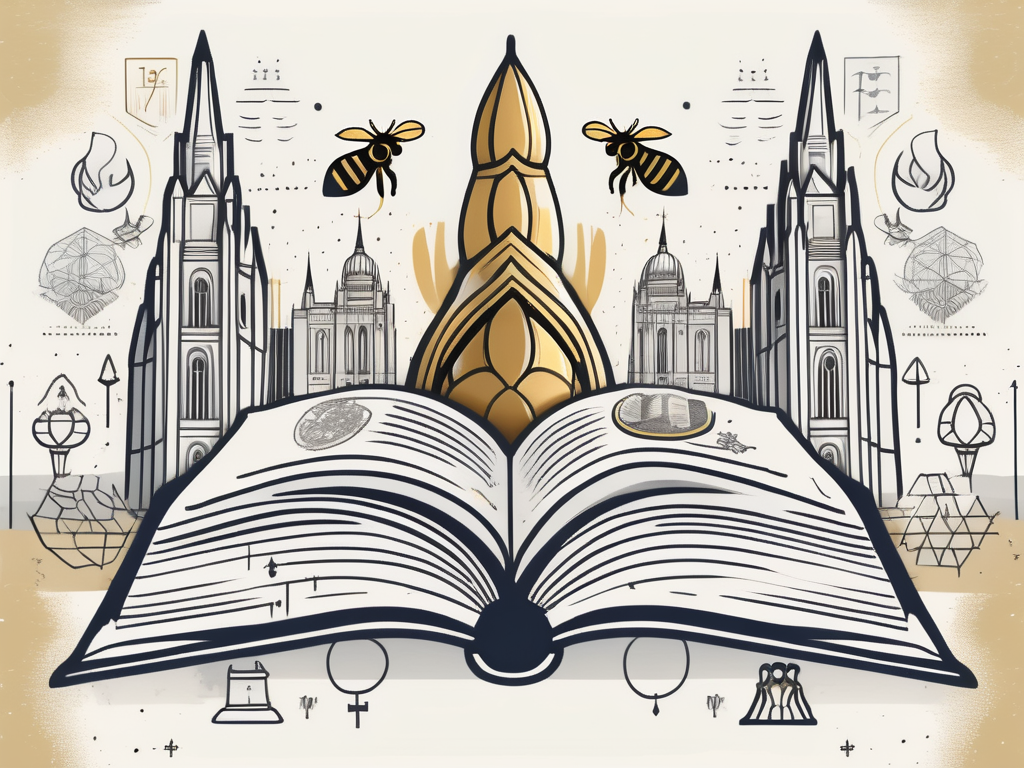The Bible is a complex and intricate book that has shaped the beliefs and values of millions of individuals throughout history. One area that has sparked much debate and discussion is the role and significance of women in the scriptures. From the beginning of creation to the teachings of Jesus Christ, the Bible offers insights into the lives and experiences of women. Let’s dive in and examine what the Bible has to say about women.
Understanding the Role of Women in the Old Testament
The Old Testament, also known as the Hebrew Bible, provides us with a rich tapestry of stories and teachings about women. In the book of Genesis, we witness the creation of Adam and Eve, the first man and woman. Eve is depicted as a companion and helper to Adam, showcasing the importance of partnership and unity in relationships.
In addition to Eve, the Old Testament introduces us to other remarkable women who played significant roles in shaping the course of history. One such woman is Sarah, the wife of Abraham. Despite facing infertility for many years, Sarah eventually gives birth to Isaac, the promised son who becomes the father of the Israelite nation. Sarah’s unwavering faith and perseverance serve as an inspiration to women throughout generations.
In the book of Exodus, we encounter the story of Moses and the miraculous deliverance of the Israelites from Egypt. Amidst this epic journey, we see the faith and courage of women like Miriam and Jochebed. Miriam, Moses’ sister, played a crucial role in the liberation of her people by leading them in triumphant songs of praise. Her leadership and devotion to her community exemplify the strength and resilience of women in the face of adversity.
Another remarkable woman in the Exodus narrative is Jochebed, Moses’ mother. Faced with the threat of her son’s life, she exhibits unconditional love and sacrifice by placing him in a basket and sending him down the Nile River. This act of desperation ultimately leads to Moses being discovered and raised by Pharaoh’s daughter, allowing him to fulfill his destiny as the great leader of the Israelites. Jochebed’s selflessness and determination highlight the profound impact that mothers have in shaping the lives of their children.
Proverbs, a book attributed to the wisdom of King Solomon, showcases the importance of wisdom and virtue. One standout figure is the personification of wisdom as a woman. This portrayal highlights the value and power of wisdom, encouraging both men and women to seek understanding and discernment. The personification of wisdom as a woman challenges societal norms and emphasizes the intellectual capabilities and contributions of women.
Throughout the Old Testament, women play diverse and significant roles. They are not merely passive observers, but active participants in the unfolding of God’s plan. Their stories serve as a testament to the strength, resilience, and wisdom of women, inspiring future generations to embrace their own unique roles and contributions.
The New Testament’s Perspective on Women
The New Testament, focusing on the life and teachings of Jesus Christ, presents a revolutionary perspective on the role of women. In the Gospels, we see women as disciples and crucial followers of Jesus. Mary Magdalene, for instance, is prominently featured as one of the first witnesses to Jesus’ resurrection, emphasizing the equality of women in spreading the Good News.
But the New Testament goes beyond just highlighting the role of women as witnesses. It also showcases their active participation in various leadership and teaching roles within the early Christian community. The Epistles, letters written by early Christian leaders, provide further evidence of women’s involvement in these important positions.
One such woman mentioned in the Epistles is Phoebe. In Romans 16:1-2, the apostle Paul introduces Phoebe as a deacon of the church in Cenchreae. This designation indicates that she held a position of authority and responsibility within the community. Paul commends her to the Romans, urging them to support her in whatever she may need, highlighting the respect and esteem she held among her fellow believers.
Another notable woman mentioned in the New Testament is Priscilla. Alongside her husband Aquila, Priscilla is portrayed as a teacher of Apollos, a learned man who was only familiar with the baptism of John. Acts 18:26 states that Priscilla and Aquila took him aside and explained the way of God to him more accurately. This incident not only demonstrates Priscilla’s knowledge and understanding of the teachings of Jesus, but also her active role in instructing others in the faith.
Furthermore, the New Testament acknowledges the contributions of Junia, a woman who is described as being “outstanding among the apostles” in Romans 16:7. This verse not only recognizes Junia as an apostle, but also highlights her exceptional qualities and significant impact within the early Christian community. Her inclusion in the list of esteemed believers further emphasizes the importance of women in the growth and development of the early church.
These examples from the New Testament provide a glimpse into the significant roles women played in the early Christian community. They were not merely passive observers or supporters, but active participants in leadership, teaching, and spreading the teachings of Jesus. The New Testament’s perspective on women challenges traditional societal norms and underscores the equality and value of women in the eyes of God.
Biblical Women and Their Virtues
Throughout the Bible, we encounter numerous women who exemplify various virtues and qualities. Two standout virtues are faith and courage, demonstrated by figures like Sarah and Hannah, as well as Esther and Deborah.
Sarah and Hannah both faced the challenge of infertility, yet their unwavering faith in God’s promises led to the birth of Isaac and Samuel, respectively. Their stories remind us of the power of faith and trust in God’s timing and plans.
Let’s delve deeper into the lives of these remarkable women and explore the lessons we can learn from their experiences.
Sarah, known for her beauty and grace, was married to Abraham. However, she struggled with infertility for many years. Despite the societal pressure to bear children, Sarah never lost faith in God’s promise that she would become the mother of nations. Her patience and unwavering belief in God’s plan ultimately led to the birth of Isaac, the son through whom God’s covenant would be fulfilled.
Hannah, another woman who faced the pain of infertility, poured out her heart to God in prayer. In her desperation, she made a vow that if God granted her a son, she would dedicate him to His service. Hannah’s faithfulness and persistence in seeking God’s intervention were rewarded when she gave birth to Samuel, who would become a great prophet and judge in Israel.
These stories of Sarah and Hannah teach us that even in the face of seemingly insurmountable challenges, faith can move mountains. They remind us to trust in God’s promises and to wait patiently for His perfect timing.
Now, let’s turn our attention to two other courageous women in the Bible – Esther and Deborah.
Esther, a brave and courageous queen, found herself in a position of great influence and power. When her people, the Jews, faced extermination at the hands of Haman, a wicked advisor to the king, Esther risked her life by approaching the king without being summoned. Through her bravery and strategic planning, she was able to expose Haman’s evil plot and save her people from destruction. Esther’s story serves as a powerful example of the importance of taking a stand for justice, even when it involves personal risk.
Deborah, on the other hand, was a prophetess and judge who fearlessly led the Israelites into battle. In a time when women were often marginalized and their leadership abilities questioned, Deborah defied societal norms and demonstrated the strength and capabilities of women. Her wisdom and courage inspired the Israelites to victory, and she is celebrated as one of the great heroines of the Bible.
These stories of Esther and Deborah remind us that courage knows no gender and that God can use anyone, regardless of societal expectations, to accomplish great things. They encourage us to embrace our unique strengths and talents, stepping out in faith and boldly pursuing the purposes God has for our lives.
As we reflect on the lives of these biblical women, we are inspired by their virtues of faith and courage. Their stories serve as a testament to the power of trust in God’s promises and the transformative impact of stepping out in bravery. May we strive to embody these virtues in our own lives, drawing strength and inspiration from these remarkable women of faith.
The Bible’s Teachings on Women’s Rights and Roles
It is crucial to understand the cultural context in which the Bible was written to accurately interpret its teachings on women’s rights and roles. In biblical times, women faced numerous challenges and limitations compared to men.
However, the Bible also showcases instances where women were respected and valued. Jesus, for example, interacted with women from various backgrounds and treated them with dignity and compassion, challenging societal norms of his time.
The role of women in the church according to the Bible is a topic of ongoing discussion. Some interpret certain passages, such as 1 Timothy 2:12, as limiting the leadership roles of women in congregations. Others emphasize the inclusive teachings of Jesus and the active involvement of women in the early church.
Expanding on the cultural context, it is important to note that in biblical times, women were often seen as property and had limited legal and social rights. They were expected to fulfill traditional roles as wives, mothers, and caretakers of the household. Women were not typically involved in public life or decision-making processes. Their primary purpose was to support and serve their husbands and families.
Despite these societal norms, the Bible presents examples of women who defied expectations and played significant roles in the history of Israel. For instance, Deborah, a prophetess and judge, led the Israelites to victory in battle. Esther, a Jewish queen, risked her life to save her people from genocide. These stories demonstrate that women had the capacity for leadership and courage, even in a patriarchal society.
Jesus’ interactions with women were revolutionary for his time. He treated women as equals, engaging in meaningful conversations with them and valuing their contributions. In a society where women were often marginalized, Jesus’ actions challenged the status quo and affirmed the inherent worth and dignity of women.
Furthermore, the New Testament highlights the active involvement of women in the early Christian community. Women like Priscilla, Phoebe, and Lydia are mentioned as leaders, teachers, and benefactors of the church. They played crucial roles in spreading the message of Jesus and supporting the growth of the early church.
However, it is important to acknowledge that the Bible contains passages that have been interpreted as limiting the leadership roles of women in the church. For example, 1 Timothy 2:12 states, “I do not permit a woman to teach or to assume authority over a man; she must be quiet.” This verse has been debated and interpreted differently by various Christian denominations and scholars.
Some argue that this verse should be understood in its historical context, as specific to the situation in the early church. They emphasize that Paul’s instructions were addressing a particular issue in the Ephesian church, where false teachings were causing disruption. Others interpret this verse as a timeless command, asserting that women should not hold positions of authority over men in the church.
On the other hand, many Christians emphasize the inclusive teachings of Jesus and the equality of all believers in Christ. They point to passages such as Galatians 3:28, which states, “There is neither Jew nor Gentile, neither slave nor free, nor is there male and female, for you are all one in Christ Jesus.” This verse is seen as affirming the equal worth and value of all individuals, regardless of gender.
Ultimately, the interpretation of the Bible’s teachings on women’s rights and roles is a complex and ongoing discussion within Christianity. It requires careful study of the cultural and historical context, as well as an examination of the broader themes of love, justice, and equality that are central to the message of Jesus.
Controversial Biblical Passages About Women
There are a few passages in the Bible that have sparked controversy and varying interpretations regarding women’s roles. One such passage is 1 Timothy 2:12, which states, “I do not permit a woman to teach or to assume authority over a man; she must be quiet.” This verse has led to debates about the extent to which it applies to all situations or whether it was specific to the cultural context of the early church.
Ephesians 5:22-24, which instructs wives to submit to their husbands, is another verse that has raised questions and concerns. However, it is essential to view this passage in the larger context of the chapter, which also emphasizes mutual love and respect within marriage.
In Conclusion
The Bible’s teachings on women are multifaceted and open to interpretation. It is crucial to approach each passage with sensitivity to the historical and cultural context in order to understand its intended meaning. While some passages may seem limiting or controversial, the overarching message of the Bible emphasizes the equal worth, value, and importance of both men and women as beloved children of God.
As we engage in discussions about gender and equality, let us seek to understand and appreciate the diverse perspectives within the scriptures, while also recognizing the need to apply their principles in a way that promotes justice, love, and inclusivity for all.












